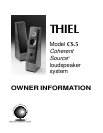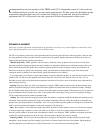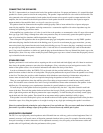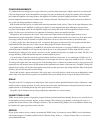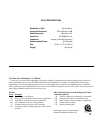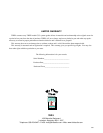CONNECTING THE SPEAKERS
The CS.5’s input terminals are located on the back of the speaker at the base. For proper performance, it is essential that both
speakers in a stereo system be wired in the same polarity. The speaker’s input terminals are color coded to facilitate this. The
wire connected to the red input terminal of each speaker should connect to the respective positive output terminals of the
amplifier; the wire connected to the black input terminal of each speaker should be connected to the respective negative
output terminals of the amplifier. Make sure that all connections are tight.
The speakers should be connected to the amplifier with high quality cable to insure minimal loss of power and proper
control by the amplifier. If the speakers are being connected to a vacuum tube amplifier with various impedance taps, the
4 ohm tap will probably give the best results.
If the amplifier has a speaker fuse or if a fuse is used in line to the speakers, we recommend a value of 2 amps of the normal
blow type (type 3AG-2 amp). Although fuses offer some protection, they do not necessarily protect the speaker against all
types of overload and also introduce audible degradation of the signal.
Due to European CE regulations that do not permit banana plug type loudspeaker connections, we ship THIEL speakers
with removable plugs installed in the ends of the binding posts. If you wish to use banana plug type connections, you may
remove the plastic plug inserted into the end of each plastic binding post cap. To remove the plugs, completely remove the
two post caps by turning them counter-clockwise with a
1
⁄2-inch nut driver or wrench until the caps come off the threaded
post. Using a small screwdriver or similar tool, push the plug out from the bottom of the cap. Reinstall the plastic caps on the
threaded posts. (Note: You may wish to modify the plastic binding posts caps one at a time to insure that the properly colored
cap is reinstalled on the correct post.)
STABILIZER PINS
Speakers positioned on a soft surface such as carpeting are able to rock back and forth slightly and will vibrate in reaction to
those forces the speaker generates to move the driver diaphragms. (Every action has an equal and opposite reaction.) This
motion of the speaker causes a loss of musical information and reduces the clarity of the music.
In order to eliminate this effect, the THIEL CS.5 can be used with the provided stabilizer pins. The stabilizer pins are
pushed into three sockets in the base of each speaker. The pin point penetrates the carpet and allows the speaker to rest firmly
on the floor. The three pins provide a stable foundation which eliminates some obscuring of information and produces a
cleaner, more articulate sound. No pins are required when placing the speakers on hard or smooth surfaces.
There are some applications where the stabilizer pins will not bring an improvement in sound but may actually make it
worse. This situation occurs when the floor itself is not rigid and therefore vibrates when connected to the speakers via the
stabilizer pins. We encourage you to experiment to determine for yourself whether or not this is the case.
To insert the pins, tilt the speaker forward and push the two back pins fully into the 1" deep holes located in each back
corner of the base. Then rock the speaker backward and insert the front pin. Finally, press firmly on the top of the speaker
with a slight rocking motion until the pins penetrate the carpet completely. To check that the pins are firmly seated, lightly
tap the back and side of the speaker. There should be no movement and the speaker should feel solidly in place.
If the speaker is moved with the pins in place, care should be taken to lift the speaker straight upward until all the pins have
cleared the carpet. Also, tilting the speaker so its weight is resting on any single pin can damage the speaker’s wood base.
Please be cautioned that the pointed pins can be dangerous if not used with care. They can cause small dents in hardwood
floors and it is possible to damage carpets if the speakers are moved incorrectly with the pins in place.
ASSOCIATED EQUIPMENT
The CS.5 is a very high quality sound reproducer and will benefit from use with very good associated equipment. Since it is
extremely accurate, it will reveal sources of distortion generated elsewhere in the system. For example, distortion resulting
from poor recordings or inferior electronics will be reproduced accurately. Also, the quality of the interconnect cables and
speaker cables will significantly effect the performance of the system.



